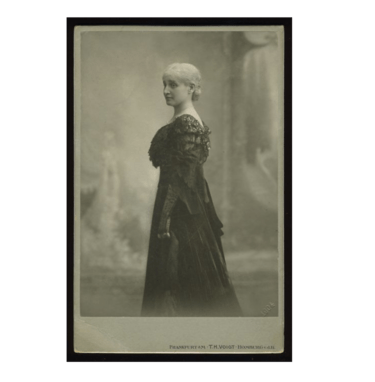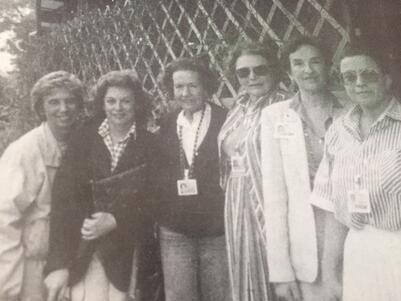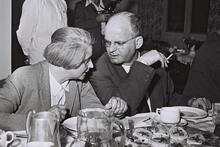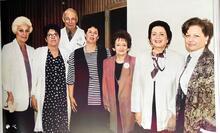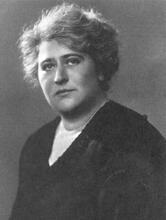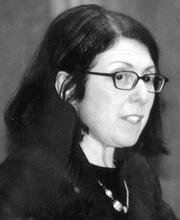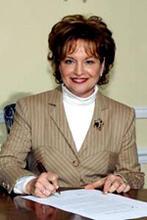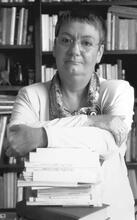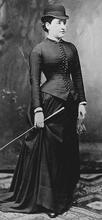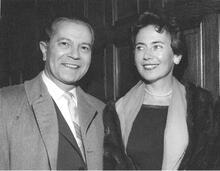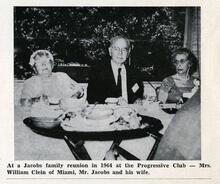International Council of Jewish Women
The International Council of Jewish Women (ICJW) is rooted in the voluntary involvement of Jewish women who are motivated by their roots in Judaism and a sense of Jewish solidarity. Established in the early twentieth century and reconstituted immediately after World War II, ICJW evolved with needs and events over time. As a women’s NGO, it participates in a variety of projects promoting women’s rights and children’s rights, combating elder abuse, and working for persons with disabilities, migrants and minorities according the UN principle “of leaving no one behind.” As an apolitical Jewish women’s organization, ICJW lobbies against BDS, antisemitism, and racism and fights anti-Israel bias.
Introduction
The International Council of Jewish Women (ICJW) is an umbrella organization representing 37 Jewish women's organizations (affiliates) in 35 countries, worldwide.
Its affiliates carry out the direct work of the organization, deciding on areas of advocacy and projects according to locally identified needs, most often within the framework of local Jewish communities. At the same time, they actively promote the objectives of ICJW, in interaction with society at large, in the fields of women’s human rights, trafficking, and inter-religious and intercultural activities. Today, the European region has the greatest concentration of affiliates.
ICJW’s head office rotates according to the place of residence of its current president, who is elected for a period of four years. Plans for future actions are decided by the members of the Executive, at Executive meetings and international quadrennial conventions that take place in various countries. Each affiliate organization retains its own name and has its own projects.
ICJW has had consultative status at the United Nations as a non-governmental organization (NGO) with the Economic and Social Council (ECOSOC) since 1964. It maintains permanent UN delegations in New York, Geneva, and Vienna. It is also represented at UNESCO, the Council of Europe, the European Women’s Lobby, the International Council of Women, the World Jewish Congress, and many other international and regional organizations.
ICJW is an organization based on the voluntary involvement of Jewish women motivated by their roots in Judaism and a sense of Jewish solidarity. Established in the early twentieth century and reconstituted immediately after World War II, ICJW never ceased its development, evolving with the needs and events over time.
ICJW's Early Years
First steps towards internationalization of Jewish women's organizations
In the modern world, Jewish organizations were a major revolution in the history of Jewish people. Despite finding themselves divided into diverse nationalities and identities in the wake of emancipation in the eighteenth and nineteenth centuries, Jews maintained their involvement. At the time, the best expression of solidarity was the establishment of powerful organizations to lobby for Jewish causes.
Jewish women first organized themselves on a national scale at the end of the nineteenth century. The pioneer organization was the National Council of Jewish Women (NCJW) in the United States, founded in 1893 and followed by many others around the world.
From the beginning of the twentieth century, some of these local Jewish women’s organizations tried to establish activities on an international level. They modeled themselves on the International Council of Women (ICW), which was established in America in 1888. At a meeting in London in 1899, Hannah G. Solomon, president of the NCJW, encouraged the creation of the Union of Jewish Women of England. At the next meeting, in Berlin in 1904, she welcomed the creation of the German Jewish women’s organization, the Jüdischer Frauenbund, by Bertha Pappenheim. That same year, in an address at Temple Israel in Saint Louis, Solomon expressed “the importance of an international bond among Jewish women.”
Each of these three Jewish women's organizations was involved (separately) in the struggle against international trafficking in women and girls and participated in all the international conferences combating it. The idea of founding a worldwide organization came into being during these meetings. Officially, ICJW was established in 1912. According to the American Jewish Yearbook (1914-15 vol.16, p.200) it was institutionalized in 1914, "electing Miss Pappenheim as president".
A great deal of courage and daring was needed to establish an international women's organization at that time. The magnitude of the task was overwhelming. Many Jews the world over, in dire straits caused by poverty, persecution, and pogroms, sought refuge in friendlier countries. Among the waves of Jewish immigrants, women were the most vulnerable, especially single women, young girls travelling alone, abandoned wives, and destitute women. Jewish women’s organizations were providing extensive social services and humanitarian assistance in their own countries, helping immigrants, the sick, and the elderly. Under the auspices of an international organization, these humanitarian services could be elevated to a new level: they were now available to tens of thousands of Jews in distress throughout the world, particularly in Eastern Europe, who desperately needed help.
1923 and 1929 Congresses of Jewish Women
The history of the International Council of Jewish Women between the two World Wars can be summarized by two impressive conferences of Jewish women. These meetings were initiated and financed largely by NCJW, which sent an important delegation, with Rebekah Kohut serving as President of these World Congresses of Jewish Women.
The first Congress of Jewish Women convened in Vienna in May 1923 in an impressive setting and with massive press coverage, in the presence of the Austrian President, the Mayor of Vienna, the Chief of Police, and many Viennese literary figures and politicians. Delegates from Jewish women’s organizations from over twenty countries were present, as well as leaders of the local Jewish community. It was a show of strength from Jewish women, who proved their ability to represent the interests of the Jewish people and to discuss the grave and painful problems of the time. Congress resolutions included an appeal for measures to protect children and homeless girls; to prevent prostitution and trafficking in women; to combat antisemitism; to promote equality for women in Jewish communities, and "the support for the work carried out in Palestine." A popular resolution was Rebekah Kohut's biblical-styled appeal to all the nations to "establish a peace as described by the Prophets of Israel."
The second world Congress of Jewish Women convened in 1929 in Hamburg, Germany. As in 1923, the event was a show of Jewish women’s solidarity on an international scale. This Congress was attended by 200 representatives, including a large delegation of very dynamic and energetic German women led by Berta Pappenheim. Delegates from fourteen countries came together to discuss subjects of common interest and to formalize a world organization of Jewish women, as agreed upon at the previous Congress. The various sessions dealt with general concerns of Jewish communities and with problems faced by Jewish women in particular: the internationalization of protection of girls and women, Jewish education, the struggle against antisemitism, the tragedy of abandoned wives, and cooperation in the work of Jewish Palestine. This time, the question of Palestine was more accentuated than at the previous conference.
These two international Jewish women’s congresses attracted a great deal of publicity but were not immediately followed by action. After the rise of Nazism, European women’s organizations were disbanded. Organizations that were able to pursue their activity did so independently. The American National Council of Jewish Women participated in social action and rescue work. On the question of Palestine, it vacillated between neutrality and formal support. This ambivalence towards Zionism was resolved over time by several factors combining Jewish solidarity with historical events. In view of events in Europe, the NCJW published a declaration strongly condemning the 1939 British White Paper that restricted Jewish immigration in Palestine and reaffirming its support of the upbuilding of Palestine in the spirit of the Balfour Declaration.
After World War II
Re-establishing a Structured Organization
Immediately after World War II the National Council of Jewish Women decided to revive its overseas program and to participate in the rescue actions of the Joint Distribution Committee. At the NCJW convention held in Dallas in 1946, Mildred Welt, president of the NCJW, proposed that the international Jewish women’s organization that had never been formally structured and that had been effectively dead for nearly twenty years be re-established. Her proposal was unanimously accepted.
The first problem facing this initiative was to revive the organization after so long an interval. Who even remembered its brief existence? Twenty years had elapsed, years of extermination, of clandestine activity and massive displacements of Jewish populations. Some, however, remained convinced of the necessity of re-establishing the international Jewish women’s organization in accordance with the principles that had guided its creation at the beginning of the century.
The president of the American NCJW sent messages to Jewish women’s organizations in France, England, Mexico, Switzerland, Belgium, Australia, South Africa, and Brazil, all of which had been in contact with the NCJW in previous years. The letter stated: “We in the United States believe that there is a great need for the opportunity of meeting with the Jewish women of the world whose interest, work and problems undoubtedly are similar to ours. We realize how much we can gain from each other.”
After two years of preparation, the international meeting was held May 29 to June 1, 1949, at the Council Home in Paris, a home for single women that NCJW had founded as part of its overseas program. Officially represented Jewish women’s organizations included the US National Council of Jewish Women, the National Council of Jewish Women of Canada, the Union of Jewish Women of South Africa, the Union of Jewish Women of Australia, the Union of Jewish Women and the League of Jewish Women of England, and the Union of Jewish Women of Switzerland. These organizations formed the nucleus of the new International Council of Jewish Women. Other delegates were from the Netherlands, Greece, North Africa, and Italy. Israel was represented by the wife of the Israeli Ambassador to France.
Although the participants reached no major decisions, the meeting helped to give the International Council of Jewish Women some of its basic structures and to define its principles, most of which apply to this day. The ICJW was defined as a federation of national women’s organizations, independent of each other and apolitical in nature. Its objectives were essentially “to promote friendly relations and understanding among Jewish women of all countries; to further the best and highest interests of humanity; to uphold and strengthen the bonds between Jewish communities throughout the world; to support the principles of the United Nations Bill of Human Rights; and to improve the status of women.”
Strengthening ties with Israel: The Council of Women’s Organizations in Israel joins ICJW
The newly created State of Israel intrigued and excited the members of ICJW. Most of its affiliate organizations had begun developing various aid programs for Israel, each according to its own character. Major funds were devoted to the Hebrew University of Jerusalem, a symbol of Jewish culture and education. After the ICJW’s 1954 convention, the Council of Women’s Organizations in Israel joined ICJW. This opportunity to develop a relationship with Israeli women was warmly welcomed. In 1957, at its convention in Israel, the ICJW officially passed a resolution supporting the Jewish state. The resolution stressed that “ICJW urges its affiliate organizations to give their support to the continuing social, economic and cultural upbuilding of Israel.” From this point on, ICJW’s flyers included the objective “to show solidarity with Israel, and to support the efforts of Israel to secure a just and lasting peace, economic security, social, educational and cultural development.”
By neglecting neither Israel nor the problems of Jewish communities in the Diaspora, ICJW, like many Jewish organizations, proved that it is possible to combine the specific and the universal: to preserve one’s own identity while still identifying with the needs of others. Indeed, ICJW’s motto was already: “Promoting a Just Society based on Human Rights and Jewish Values.” Under this credo, ICJW, as an International umbrella organization and a women’s Non-Governmental Organization (NGO), developed numerous projects and activities.
Crossing the Century: 1960-2020
International Council of Jewish Women representatives at the Third World Conference on Women in Nairobi, Kenya, held from July 15-26, 1985. This UN Conference reviewed and appraised the achievements of the UN Decade for Women (1975-1985). Left to right:
Barbara Leslie (UN New York), Andrée Farhi (UN Geneva), Stella Rozan (Paris, ICJW President 1987-1990), Leila Siegel (UN Geneva, ICJW President 1984-1987), Karmela Belinki (ICJW Finland). Courtesy of ICJW.
ICJW at the United Nations
First Steps as an NGO
At the first post-war meeting held in 1949, the ICJW leaders invited representatives of the newly founded United Nations, to attend. Their program in the following years was "primarily concerned with serving the needs of World Jewry and implementing the Bill of Rights of the United Nations.” At the 1951 ICJW Convention, a perman
Karmela Berlinki of the International Council of Jewish Women speaking at the 43rd session of the UN’s Human Rights Council, February 26, 2020.
ent observer to the UN was appointed, and some years later, a special committee for UN affairs was constituted.
In 1964 ICJW was officially recognized as a Category II Non-Governmental Organization at the UN Economic and Social Council (ESOCOC). This status was an official recognition of its mission, enabling it to express the points of view of the affiliates it represented. Among the topics followed by the ICJW representatives at the time was appealing to their affiliates to intervene in their countries in favor of the Elimination of all Forms of Racial Discrimination (1964) and the Draft Convention on the Elimination of all Types of Religious Intolerance. They also participated actively in the Commission on the Status of Women.
Establishing Partnerships with Jewish Organizations in the UN
Beginning in the 1970s ICJW cooperated with other Jewish NGOs in several areas: campaigning for Soviet Jewry, the plight of Jews in Arab countries, antisemitism reborn in the form of anti-Zionism, and support for the State of Israel, which was going through a difficult period after the 1973 Yom Kippur War. In 1975 ICJW joined the World Jewish Congress (WJC) as an "Associate Member." Since 2005 Jewish women’s organizations ICJW and WIZO (the Women’s International Zionist Organization) are represented at the WJC Executive. Sara Winkowski, former President of ICJW (2002-2006) became one of its Vice Presidents. Today ICJW belongs to the “Informal NGO Jewish Caucus” at the UN in New York. In Geneva, Jewish NGOs are invited for briefings by the Israeli ambassador to the UN, before each March session of the Human Rights Council. ICJW also shares concerns with other Jewish NGO’s at the Council of Europe in Strasbourg and at UNESCO in Paris.
Throughout the years, ICJW has been present at all UN events: International Year of the Child, the World Conference on Aging, the International Year of Peace (in 1987, where ICJW was awarded the title “Messenger of Peace”), and the Elimination of Illiteracy Year. It was deeply concerned by the preparations for the World Conference Against Racism, Racial Discrimination and Xenophobia held in Durban, South Africa, in August/September 2001, where an attempt was made to resurrect the Zionism=Racism equation. To prevent such a development, then-ICJW President June Jacobs (1996-2002) sent letters to the UN Secretary-General and the Ministers of Foreign Affairs of France, New Zealand, South Africa, and other countries. ICJW representatives also attended the Durban Review conferences, providing regularly reminders that although progress was being made for peoples of African Descent, the anti-racist Durban Conference became a racist conference against Jews. Indeed, “One Jew, one bullet” was heard at the 2001 NGO Forum in Durban.
ICJW and Women’s Rights: from the UN Decade for Women to Beijing +25
The main ICJW actions during the UN Decade for Women (1975–1985) included participating in the UN Conferences in Mexico (1975), Copenhagen (1980), and Nairobi (1985), in the shadow of the UN resolution equating Zionism with racism. Many eminent figures worldwide expressed their indignation on this "infamous equation." The reaction of Jewish women attending the conferences as delegates of both ICJW and other organizations was one of consternation and indignation. One said ironically: "instead of condemning sexism in Mexico, it was Zionism that was condemned." The opprobrium heaped on Israel had an effect on Jews generally, as well as generating or justifying attitudes of antisemitism in the United Nations and elsewhere. The defense of Israel at the United Nations conferences became one of the main preoccupations of ICJW's UN representatives. In Nairobi (1985), Leila Seigel (ICJW president 1984-87) led the “Jewish women’s caucus” for ICJW delegates and members of other Jewish organizations. All were particularly active in ensuring that the shocking “Zionism as a form of Racism” resolution be expunged from the conference’s final document.
ICJW representatives also participated in later UN conferences on women, including in Beijing (1995), Beijing + 5 (2000), Beijing + 10 (2005), and the regional conference of Beijing + 25, held in Geneva in October 2019.
On February 28, 2019, Ruth Dearnley, who heads the NGO “Stop the Trafik” in the UK, was ICJW’s candidate was invited by the Geneva NGO Committee on Human Rights as one of the four civil society speakers to deliver a speech at the prestigious High-Level Segment of the opening of the 40th Human Rights Council. A side event with Ruth Dearnley was organized the following day, sponsored by ICJW and co-sponsored by Graduate Women International (GWI) and the Working Group on Human Rights Education and Learning (HREL).
Whether in New York, Geneva, Paris, or Strasbourg, participation in UN NGO Committees reflects ICJW’s priorities: Committee on the Status of Women (CSW), Working Group on Girls; Committee on Sustainable Development; Committee on Human Rights; Committee to Stop Trafficking in Persons (CSTIP); Committee on Freedom of Religion or Belief; Committee on Aging; Working Group on Human Rights Education and Learning, and Committee on Anti-Discrimination, Diversity and Inclusion.
The ICJW representatives at the UN in New York recently joined the Committee of Religious NGOs at the United Nations (CRNGO). The committee is composed of representatives of national and international non-governmental organizations. CRNGO serves as a forum for exchanging and promoting shared religious and ethical values. In Geneva ICJW has been a member of the NGO Freedom of Religion or Belief (FORB) Committee for more than 15 years.
Because of the emergence of Coronavirus, the annual CSW (Commission on the Status of Women) meeting in New York of March 2020 was cancelled. This was a huge disappointment for thousands of members of women's NGOs who were ready to come to New York from all over the world to celebrate Beijing + 25. The CSW64/Beijing+25 Conference was meant to be a significant UN conference marking the twenty-fifth anniversary of the adoption of the Beijing Declaration and Platform for Action.
Just before the lockdown in Geneva, Dr. Karmela Belinki of ICJW Finland, as a participant of all 4 UN Conferences on Women, was chosen as a privileged civil society speaker at the 43rd Council of Human Rights. By chance, she was still able to address the High-Segment Plenary, underlining that “Each Conference gave us incentives for further action.” A memorable event for ICJW!
Main Activities of ICJW and Its Affiliates
In the late 1970s and the 1980s ICJW affiliates were active campaigning for Soviet Jewry. In the late 1980s, Beatrice Zucker of Zurich, as ICJW European president and afterwards as chair of the ICJW “Extension and Field Committee,” reached out to Eastern and Central European countries to found new affiliates. Interviewed in the film “Those were the Days,” shown at the 2012 European Conference in Berlin to celebrate ICJW’s 100th Anniversary, Thea Zucker of Antwerp stated that her most memorable moments were learning that new Eastern European, Central European, and Russian affiliates had joined ICJW: Croatia, Bosnia-Herzegovina, Hungary, Bulgaria, the Czech Republic, and Slovakia, and later Russia, Ukraine, Georgia, and Poland.
In June 1993, the World Conference of Human Rights in Vienna (the first human rights conference since the Cold War) recognized that “Women’s Rights are Human Rights.” ICJW, as well as its grassroots affiliates, adopted a human rights approach to its on-going activities, whether care for elders, health campaigns, campaigns against domestic violence, or Jewish women’s inequality in matters of marriage or divorce. As a women’s NGO, ICJW, together with other women’s NGOs, demands that prostitution and human trafficking be considered human rights violations.
During her presidency (1987-1990), Stella Rozan was the first to understand the importance of the European Women Lobby (EWL) and to decide that ICJW would become a member. EWL has since grown considerably to become the largest women's organization in Europe. Its strength lies in its advisory role to the European Commission in all matters pertaining to women's rights. ICJW has been very active in the various fields where the Lobby is present. EWL fights for equality in education, with attention to the "girl child"; equality in the work place, with equal salary for equal work; equality in pension rights; equality in health care; and equality in the family with sharing of the burden.
Commitment to Zionism and Israel
In the post-war period, the situation of the Jews after the Shoah and the difficulties confronting the newly born State of Israel helped to shape the agenda of Diaspora Jewish organizations. Over time, the achievements of the State of Israel proved its capacity to save Jews in danger, while at the same time a new kind of animosity in the name of "anti-Zionism" appeared. The close ties ICJW leaders developed with their colleagues in Israel allowed Diaspora women a better understanding of the needs and the existential dilemmas of the Israelis citizen. It eventually led to a greater involvement and constant support of Israel by ICJW.
The Fight against Antisemitism and Racism
When, in the 1980s, the ICJW president asked Rosalind Preston of Great Britain to chair the new committee against antisemitism, the condition was that this work be integrated into the general framework of the fight against racism. Thus, the Committee against Antisemitism and Racism was created at the1987 ICJW convention.
Obviously, ICJW, as a Jewish organization, is concerned by antisemitism. The aims were to coordinate actions against antisemitism and anti-Zionism in all their forms, to inform its affiliates of developments of all forms of antisemitism, and to combat prejudice and discrimination everywhere. ICJW also created a committee for interfaith relations, in order to promote rapprochement between religions and to combat prejudice. Among the affiliates' education programs, Shoah remembrance is of high importance in order to educate people about what occurred during the Holocaust.
The topics that continue to concern the members of ICJW are the BDS (Boycott-Divestment-Sanctions) movement, the difficulty of distinguishing between legitimate and antisemitic criticism of Israel, and lobbying in favor of the widely accepted definition of antisemitism by the International Holocaust Remembrance Alliance (IHRA).
The Status of Women in Jewish Law
ICJW has been at the forefront of fighting for Jewish women’s rights since the 1950s. The agunot campaign for equal rights for Jewish women in matters of marriage and divorce (“to get the Get”) has been on-going for several decades. In the 1970s and 1980s, the organization held several international meetings on the problem of agunot, women whose husbands refuse to give them a religious divorce (Get) and free them from unwanted or non-existent marriages. A petition was signed by women from all ICJW affiliates and delivered to the Israeli Chief Rabbi in the early 1990s. Despite these efforts, little progress was made, and in 1997 the Executive Board of ICJW voted to establish “the International Jewish Women’s Human Rights Project,” directed by Dr. Sharon Shenhav, an Israeli women's rights lawyer specializing in religious divorce. Shenhav declared that the project would publicize cases of agunot worldwide and would search for Jewish law and civil law solutions to the problem. Working with lawyers, judges, and rabbis in Jewish communities worldwide, she began to gather solutions that had been successful in freeing Jewish women from unwanted and often abusive marriages. Many ICJW affiliates (UK, France, US) were active in this campaign, introducing among others pre-nuptial agreements. ICJW convinced the Israeli Sephardic Chief Rabbi Shlomo Amar, who took this problem very seriously. This first conference of the Global Rabbinic Task Force on Agunot was scheduled for November 7 and 8, 2006, at the Jerusalem Center for Public Affairs (JCPA). After considerable pressure from ultra-Orthodox circles, this conference was cancelled at the last moment. It was a huge disappointment for ICJW president Leah Aharonov and her colleagues, after months of effort. It generated, however, important media attention for ICJW, and especially for the plight of agunot, in Jewish newspapers and websites around the world.
Interfaith and Intercultural Committee
Already active in monthly “Interfaith Breakfasts” in London, during her presidency (1996–2002), June Jacobs decided to create a CJW Interfaith Committee, headed by Nadine Iarchy. With her experience in the regional Antwerp dialogue group between Christian and Jews, Iarchy organized two seminars on behalf of ICJW. The first seminar was held in Brussels in 1997 under the title “Respect, Equality, Dialogue”; the second European Women’s Interfaith conference took place in Sarajevo in 2000. After the 10th ICJW European Conference in Prague in 1998, on the theme of “Jews in Multicultural Europe,” ICJW’s Interfaith Committee broadened its name to “ICJW Interfaith and Intercultural Committee.” The Australia and South Africa affiliates were particularly active on this committee. Iarchy was chosen to represent Judaism at the European “Religions for Peace.” In Belgium, she represents ICJW at the “Organe de Consultation entre Chrétiens et Juifs de Belgique” (OCCJB; Consultative Body for Belgian Christians and Jews), affiliated with the International Council of Christian and Jews (ICCJ). During their international meeting held in Rome in 2015, Iarchy was introduced to the Pope, and in 2018, she was introduced to the King of Belgium, in recognition for her work representing ICJW as a bridge-builder; in 2019 the Belgian Senate honored her as a “Woman of Peace.”
Jewish Education
Following the example of the UN international days, ICJW decided to institute an annual International Jewish Education Day. All affiliate organizations were asked to reflect on and discuss an annual study theme. The first theme was “Jewish identity in a multicultural society,” in October 1987.
The ICJW Israel Leadership Training Seminar was established in 1969 at the initiative of ICJW president Shoshana Hareli. The program was based on the popular Israel Experience, which brings Diaspora Jews to Israel to spend a few days or weeks gaining greater knowledge of the Israel reality. In order to ensure the continuity of the project, Rosa de Herczeg, ICJW’s president from 1975 to 1981, created a fund to perpetuate this training seminar in Israel, known henceforth as the “Rosa and Esteban de Herczeg Seminar.”
The Bea Zucker Jewish Education Online Course was initially aimed at giving basic Jewish education to Jewish women in Eastern European countries. When she reached out to ICJW’s new affiliates in Eastern Europe, Bea Zucker realized the Shoah and the Communist period had deprived Jewish women of knowledge of their Jewish roots. She initiated the ICJW Jewish Education Program, which became her legacy. The program’s lessons are presented in English, Spanish, and lately in Russian. It started with courses on Women's Life Cycle Events, Jewish Festivals, Biblical Women, and the 54 Biblical chapters; now the courses focus on social justice, presenting Jewish feminist responses to the refugee crisis, prostitution, and human trafficking, as well as sexual harassment. They have been prepared from a women's perspective by two excellent Rabbis, Dr. Bonna Haberman, and Dr. Meesh Hammer Kossy.
The HIPPY Project
The ICJW HIPPY Project (Home Instruction for Parents of Pre-school Youngsters) was initiated in 1968 by the US National Council of Jewish Women and was offered to the Hebrew University of Jerusalem. The university developed HIPPY in Israel and launched it as an education and integration program in under-privileged areas within immigrant communities. It was recognized as a mother-child pre-school education project with multiple short-term and long-term effects: better school opportunities for the children who had followed this home project; confidence building and skill acquisition for their mothers; new employment opportunities; empowerment of women; and the possibility for the family to emerge from the cycle of poverty. HIPPY was both an integration project and an equal opportunity program. In the 1980s HIPPY was adopted in several areas of South Africa, and as many Jewish women moved to Australia, they brought the program with them and adapted it for indigenous communities. The Australian government gave a grant of $200.000 for the adoption of HIPPY. It was also successful in Ethiopian immigrant communities in Israel.
The Human Trafficking Outreach Project
In the early twentieth century, when Jewish women decided to found an international Jewish women’s organization, the question of prostitution and trafficking of women was central. It is not surprising that trafficking of women has been a priority for ICJW in the United Nations. NGOs such as ICJW are essential to the fight against human trafficking, providing a vast array of support services to the anti-trafficking struggle. Working locally and internationally, they help to increase public awareness of the evils of human trafficking; they work to rescue, shelter, and support the victims; and they are influential in advocating and lobbying for governmental action and legislation to eliminate this multi-million dollar criminal industry.
The Convention for the Suppression of the Traffic in Persons and of the Exploitation of the Prostitution of Others, approved by the United Nations General Assembly on December 2, 1949, entered into force on July 25, 1951. In February 2010, the European Parliament passed a resolution calling for unconditional aid to victims of trafficking and a reassessment of the penalties for traffickers. It stressed that trafficking of women for sexual exploitation has not decreased and trafficking for forced labor is increasing. In August 2009, at the United Nations Conference in Bangkok, the Anti-Human Trafficking Manual for Criminal Justice Practitioners was launched by the United Nations Office on Drugs and Crime (UNODC). In 2013, it was decided that the official UN World Day against Trafficking of Human Beings would be held each year on July 30, which became an opportunity for ICJW to initiate projects on this issue.
ICJW Affiliates and some of their initiatives
ICJW has affiliates all over the world. The affiliates are autonomous and work directly in and with the Jewish communities of their countries. Beside the two largest affiliates, the Council of Women in Israel and the US National Council of Jewish Women, there are eighteen affiliates in Europe. In the 1990s, the small Jewish women's organizations in Eastern European countries, the backbone of Jewish life in the post-communist era, joined ICJW. The solidarity of ICJW’s affiliates, particularly from Western European countries, re-enforced them as they gained expertise and support. At the European Conference, organized in Athens early November 2019 by ICJW’s newest affiliate ICJW Greece, younger women from the Czech Republic, Croatia, and Poland were particularly pleased to participate in a panel on Eastern Europe. The majority of the Greek speakers were Jewish professional women of a younger generation. They showed their enthusiasm for belonging to a century-old Jewish international organization committed to women’s rights.
Although some affiliates, such as National Council of Jewish Women of Australia, Council of Jewish Women of Bulgaria, National Council of Jewish Women of Canada, Council of Jewish Women of Finland, and the US National Council of Jewish Women, are easily recognized as being affiliates of ICJW, the majority are not, including Consejo Argentino de Mujeres Israelitas (CAMI), Fundacion Amigos de la Comunidad Golda Meir of Colombia, Coopération Féminine in France, Association Czulent of Poland, the League of Jewish Women in the UK, and Judiska Kvinnoklubben of Stockholm.
This variety is also reflected in the ICJW affiliates’ activities and projects, which are closely linked to the history and the needs of their Jewish communities. For example, Coopération Féminine in France developed a range of activities in the 1970s and 1980s to welcome, train, and integrate Jewish women arriving from Algeria, Morocco, and Tunisia. An after-school program was set up to help mothers assist their children with their homework. More recently, in 2007, NOA “Oser le dire” or “dare to speak” was initiated as a hotline for Jewish women victims of domestic violence. Some of its Jewish women's members meet Muslim women in an organization named “Langage des Femmes” (“Women speaking”).
The Union of Jewish Women in South Africa has three interesting interfaith projects with South Africa’s Chinese and Muslim communities under the name Solidarity in South Africa. The National Council of Jewish Women of Canada-Toronto has a number of important projects: “One Voice – Multi-faith Women Working to End Violence against Women”; “L’Chaim Cancer Support Group”; and “Human Trafficking Awareness” (the City of Toronto proclaimed the first Human Trafficking Awareness Day in the name of National Council of Jewish Women of Canada Toronto).
A full list of ICJW affiliates and their main activities can be found on the website: http://icjw.org/about-icjw/affiliates/
ICJW Presidents from 1949 to 2022
From 1949 to 1951: Mildred Welt (USA); 1951–1954: Gladys Cahn (USA); 1954–1957: Pearl Willen (USA); 1957–1963: Tony Robinson (USA); 1963–1966: Frances Rubens (UK); 1966–1969: Isabelle Brown (USA); 1969–1972: Shoshana Hareli (Israel); 1972–1978: Rosa de Herczeg (Argentina); 1978–1981: Eleanor Marvin (USA); 1981–1984: Marice Halper (USA); 1984–1987: Leila Seigel (Switzerland); 1987–1990: Stella Rozan (France); 1990–1996: Helen Marr (Canada); 1996–2002: June Jacobs (U.K.); 2002–2006: Sara Winkowski (Uruguay); 2006-2010: Leah Aharonov (Israel); 2010-2014: Sharon Gustafson (USA); 2014-2018: Robin Lenn (Australia); 2018-2022: Penelope Conway (U.K).
N.B: The first (and only) president elected of the newly created International Society of Jewish Women was Bertha Pappenheim, leader of the important German Jewish feminist movement (Jüdischer Frauenbund) until her death in 1936.
Conclusion
ICJW’s development over the past century has been very significant. Its history reflects general trends and major changes in Jewish society, in particular the evolution of the status of Jewish women in the Jewish communities, as well as the processes of solidarity at work in the Jewish world at large. Since the 1960s, the importance of non-governmental organizations in the United Nations and civil society has been irrefutably recognized. As a women’s NGO, ICJW participates in a variety of projects promoting women’s rights and children’s rights, combats elder abuse, and works for persons with disabilities, migrants and minorities according the UN principle of “leaving no one behind.” As an apolitical Jewish women’s organization, ICJW lobbies against BDS, antisemitism, and racism and fights anti-Israel bias.
Not content with promoting social aid and philanthropic activities, ICJW constantly initiates new projects, including training of volunteers, interfaith and inter-cultural women’s encounters, and health campaigns for women, under the banner of Judaism and Jewish ethics. ICJW also continues to demand equal rights for women in the Jewish community and equality in marriage and divorce, and to support Jewish education. Committed to women’s human rights, including Jewish women’s rights, and Tikun Olam (Repairing the world), ICJW is open to all Jewish women, religious and non-religious, in Israel and in the Diaspora.
Like many other NGOs, ICJW has been experiencing financial difficulties and faces problems of aging membership and leadership, an outdated structure and administration, and the end of an era of “professional volunteers.” In order to attract younger women who are combining career and family life, the organization is in the process of re-examining its goals, objectives, and projects. With modern technologies and new tools of communication, whether Zoom meetings, webinars, or social media, ICJW sees new opportunities to make the voice of Jewish women from all over the world heard.
More than ever, in spite of cultural differences and different outlooks, Jewish women of the different ICJW affiliates worldwide appreciate sharing common concerns and initiatives, exchanging ideas, and facing problems together. The challenge today is to rethink the way its international organization might inspire meaningful actions and advocacy to be carried out by the local affiliates and vice-versa.
Aharonov, Leah. Feminine Leadership: A Personal Journey. Ra’ananna, 2014.
Baum Charlotte, Paula Hyman, Sonya Michel. The Jewish Women in America. New York: Dial Press, 1976.
Evans, Sarah M. Born for Liberty: A History of Women in America. The Free Press, 1989.
Kohut, Rebecca. My Portion (an Autobiography). New York: Albert & Charles Boni, 1927.
Kuzmack, Linda Gordon, Woman's cause, The Jewish Woman's Movement in England and the United States, 1881-1993. Columbus: Ohio State University Press, 1990.
Las, Nelly. Jewish Women in a Changing World: A History of the International Council of Jewish Women (1899–1995). Jerusalem: The A. Harman Institute of Contemporary Jewry, The Hebrew University of Jerusalem, 1996 (translated from French: Femmes juives dans le siècle-Histoire du Conseil International des femmes juives: Paris: L'Harmattan, 1996).
Las, Nelly. “The Impact of Zionism on the International Council of Jewish Women, 1914-1957.” In American Jewish Women and the Zionist Enterprise, Shulamit Reinharz and Mark A. Raider eds. Hanover, NH: Brandeis University Press, 2005.
Nadell, Pamela. American Jewish Women's History: A Reader. NY: New York University Press, 2003.
Solomon, Hannah Greenbaum. Fabric of my Life. New York: Bloch, 1946.
Sochen June. Consecrate Everyday-The Public Lives of Jewish American Women, 1880-1980. Albany: State University of New York Press, 1982.
Interviews: Not having access to libraries and archives during the Covid-19 confinement, I relied on the information given by “living archives,” ICJW leaders and members who gave me the necessary information to update my article: Mary Liling, ICJW representative to the UN in Geneva who was particularly helpful and dedicated. She directed me to ICJW’s members active in various fields: Karmela Belinki (Finland), Gillian Gold (UK), Nadine Iarchy (Belgium), Liliane Seidman (Belgium), Sharon Shenhav (Israel) Eliane Sperling (Belgium); also ICJW president Penny Conway (UK), and past presidents, Sara Winkowski (Uruguay and USA), Leah Aharonov (Israel) and Robyn Lenn (Australia). I thank them all.
I would like to dedicate this updated article in fond memory of ICJW President Stella Rozan (1917-2009) who sponsored my research through the Hebrew University of Jerusalem. She was one of those leaders who by her devotion, has been involved in the advancement and the strengthening of the International Council of Jewish Women.


